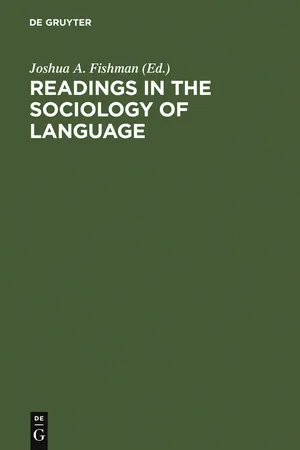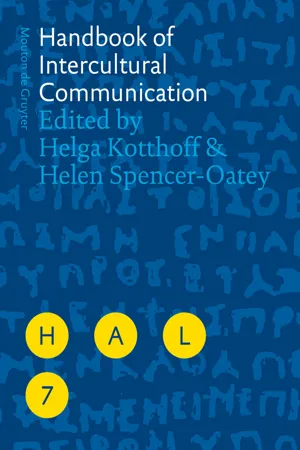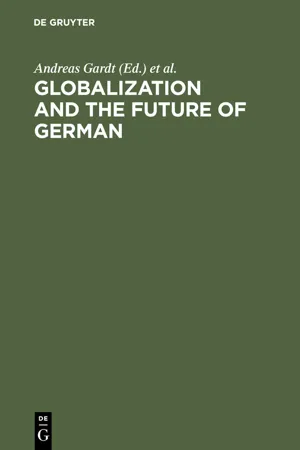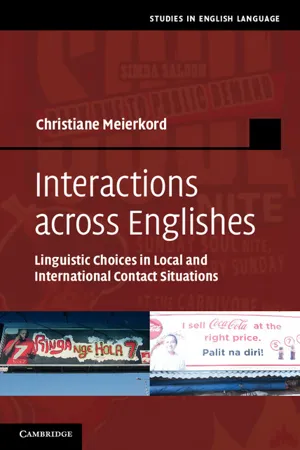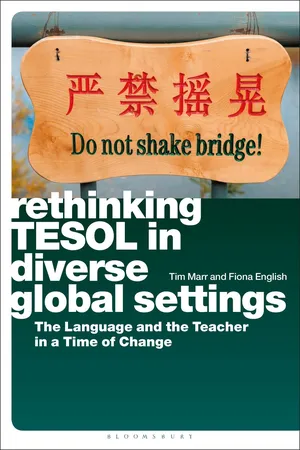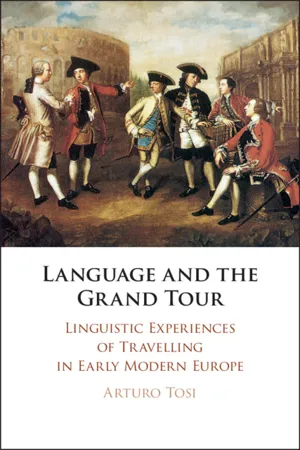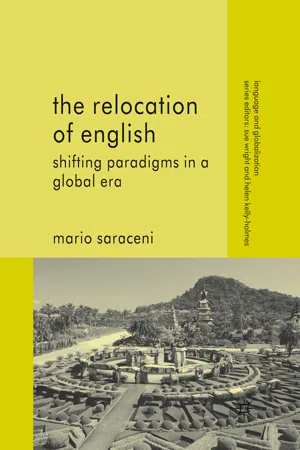Geography
Lingua Franca
Lingua Franca refers to a common language used for communication between people who do not share a native language. In geography, it often refers to a language used for trade, commerce, or diplomacy between people of different linguistic backgrounds. Historically, languages such as Arabic, Swahili, and English have served as lingua francas in various regions of the world.
Written by Perlego with AI-assistance
Related key terms
1 of 5
7 Key excerpts on "Lingua Franca"
- eBook - PDF
- Joshua A. Fishman(Author)
- 2012(Publication Date)
- De Gruyter Mouton(Publisher)
In any case, it became the basis of a language used among the Crusaders and with the non-French speaking peoples who had learned it. Lingua Francas of the World 661 The use of this particular form of French eventually died out, but not before having left its own name as its heritage for languages which are used in a similar fashion. Today when we find a language which is commonly used by people whose native languages are different, we describe it as a Lingua Franca. A DEFINITION If the term Lingua Franca is to be used with the widest possible meaning it is necessary to adopt a definition with the fewest restrictions. The following (UNESCO 1953, p. 46) is worthy of general adoption: A language which is used habitually by people whose mother tongues are different in order to facilitate communication between them. An ad-ditional requirement included in some definitions is that a Lingua Franca be a pidgin language (a so-called hybrid or mixed language), but it is not true that all Lingua Francas are pidgins. A second requirement sometimes found is that a Lingua Franca be used for commercial pur-poses, but this is again not always true of Lingua Francas, though they frequently arise in a commercial environment. Other terms compete with Lingua Franca as designations for the kind of language being discussed. Trade language (langue de traiti) is usually used for some language not included among the world's majority languages and which is used by some people as a second language in commercial situations. All trade languages are therefore Lingua Francas, e.g., Kituba and Hausa in Africa. Contact language (probably equivalent to French langue vehiculaire) is a Lingua Franca whose use is not necessarily habitual. It is the most neutral of the terms. International (or Universal) language is a Lingua Franca whose use is actually or virtually international. - eBook - PDF
- Helga Kotthoff, Helen Spencer-Oatey, Helga Kotthoff, Helen Spencer-Oatey(Authors)
- 2008(Publication Date)
- De Gruyter Mouton(Publisher)
2. The nature of Lingua Franca communication In 1953, the UNESCO defined a Lingua Franca as “a language which is used ha-bitually by people whose mother tongues are different in order to facilitate com-munication between them” (UNESCO 1953). This definition embraces two dif-ferent contexts: the use of a language which is the mother tongue to neither of the speakers involved, or a language which is the mother tongue to some of the participants but not to others. The definition furthermore comprises an infinite number of communicative purposes or contexts in which the Lingua Franca acts as a facilitator. As such, the definition is in contrast to earlier ones, which were often based on the original meaning of the term lingua franc a. This initially re-ferred to the pidgin Lingua Franca, which emerged as a language of trade and Lingua Franca communication in multiethnic contexts 201 commerce in the Mediterranean from the 15 th century until the 19 th (Wans-brough 1996). Since Lingua Franca was a trade language, the term Lingua Franca , when eventually extended to other languages used for communication across linguistic boundaries, was understood as synonymous to auxiliary lan-guage (Samarin 1987), and the use of a language as a Lingua Franca was strongly associated with its performing specific purposes. Samarin (1987) distinguishes three types of Lingua Francas: natural, pidgin-ized, and planned languages can and do serve as Lingua Francas. An example of a planned Lingua Franca is Esperanto, which was designed to enable world-wide communication, but which today mainly serves to unite the community of Es-perantists (Fiedler 2002). In this context, Esperanto is used as a spoken lan-guage in interpersonal communication and for radio broadcasts. Yet there is also a considerable body of literature, translated and original, as well as the commu-nity’s own newspaper. - eBook - PDF
Globalization and the Future of German
With a Select Bibliography
- Andreas Gardt, Bernd Hüppauf, Andreas Gardt, Bernd Hüppauf(Authors)
- 2008(Publication Date)
- De Gruyter Mouton(Publisher)
How should this new role be discussed and explained? The term Inter-national English for a particular variety of this language is typically used to describe its position in the world resulting from colonialism and migration. Its new and unique role in the age of globalisation seems to be better captured by the term Global English. But how can we precisely define the new aspects of the world-wide role of English: As a neutral tool for border-crossing communication all over the world or rather as a form of political power and cultural dominance in the global society of tomorrow? Only for the function of English as a neutral tool of international communication would its frequently used characterization as a new Lingua Franca be satis-factory and acceptable. Originally, the term Lingua Franca was used to denote a link language spoken around the eastern half of the Mediterranean Sea, serving merchants and sailors from different ethnic and linguistic backgrounds as a medium of communication. Its basis was derived from Italian idioms, but it also in-cluded Greek and Arabic language elements. Therefore in linguistics, Lingua Franca - in its proper sense - denotes a language used for a restricted range of communicative purposes and combining elements from more than one language. Generally speaking, Lingua Franca is a hybrid language for specific functions, used in a larger territory in which various national languages are spoken. If Lingua Franca is to be more than a metaphor for the global role of English, a precise definition of the functions and situations to which this term applies is required. 2 In fact, various attempts have been made to identify a particular variety of English for which, linguistically, the term Lingua Franca could make sense. - eBook - PDF
Interactions across Englishes
Linguistic Choices in Local and International Contact Situations
- Christiane Meierkord(Author)
- 2012(Publication Date)
- Cambridge University Press(Publisher)
12 12 2 From English as a Lingua Franca to Interactions across Englishes As has been explained in the introductory chapter, the use of English, or any other language for that matter, as a Lingua Franca is not a new phenom- enon. Languages have been used as Lingua Francas from when people started to interact with individuals outside of their own speech community, either when they migrated into territories outside of the area inhabited by their speech community, or when they came to trade with individuals not speak- ing their language. One of the first documented languages used for the pur- pose of allowing communication across speakers of different languages was the Mediterranean Lingua Franca, a pidgin used throughout large parts of the Mediterranean between the eleventh and nineteenth centuries. In fact this language provides the origin of the term Lingua Franca. The use of languages, particularly English, for communication between speakers of different mother tongues has been studied by scholars from vari- ous research paradigms, and section 2. 1 will start out by tracing this research history and positioning IaEs in relation to previous research. Whilst many scholars have based their reasoning on analyses of authentic data, others have approached the topic in a more conceptual manner, leading to a num- ber of myths about communication in English as a Lingua Franca. Section 2.2 will identify these myths and explain what is wrong with them in light of the realities that have been found to characterise not only the present-day use of languages as Lingua Francas, but also historical instances of Lingua Franca communication. The chapter then moves on to describe exactly these real- ities. Section 2. 3 will look at the history of English and at some other lan- guages which have a history of being used as Lingua Francas. - eBook - ePub
Rethinking TESOL in Diverse Global Settings
The Language and the Teacher in a Time of Change
- Tim Marr, Fiona English(Authors)
- 2019(Publication Date)
- Bloomsbury Academic(Publisher)
It’s worth following this. First, the definition of Lingua Franca expanded to include a natural language (i.e. not a pidgin or an artificial code, but an ethnic/national language like, say, Arabic or Portuguese or Tamil) when this is being used as a link language between speakers of two different languages, but is not the mother tongue of either of them. So that might include, for example, an Igbo-speaking Nigerian and a Hausa-speaking Nigerian using English to communicate, or a Moroccan speaking English to a Dane. It would include Tim, a native English speaker, having a conversation in Spanish with a Swiss person, as happened the last time he was on a plane bound for South America. Next – and this is the tricky bit – the term was widened by some linguists to embrace any language used between speakers who do not share the same mother tongue, even when it is the native language of one of them. This means us speaking our own native English with the Nigerian, Swiss, Moroccan or Dane, for all of whom it is a second or foreign language. It is this extension of meaning that has been particularly associated with the field of ELF studies (see Kimura 2017: 268). The outcome of all this widening of definitions, predictably, is a situation in which usage is ‘partly inconsistent and can be misleading’ (Brosch 2015: 71). This is putting it mildly. As will become apparent if we look at just a few of the definitions of the term, there exists in fact a chaotic jumble of usage. The Oxford English Dictionary, for instance, gives as one of its definitions of Lingua Franca that it is a ‘mixed jargon’, but allows several other definitions. Jenkins (2007: 1) insists that LFs are always mixed – that hybridity is a fundamental characteristic of such codes. Samarin (1972) does not hold this to be the case at all. Dakhlia (2008) allows two meanings: a ‘normal’ or natural, ethnic/national language used as a contact language, or a mixed, pidginized code with a temporary life span - eBook - PDF
Language and the Grand Tour
Linguistic Experiences of Travelling in Early Modern Europe
- Arturo Tosi(Author)
- 2020(Publication Date)
- Cambridge University Press(Publisher)
77 Black, The British Abroad, 80. 185 Latin and Other Lingua Francas was never sufficient to create the conditions for it to become a supranational Lingua Franca. That was because Latin was preferred in the multilingual Habsburg Empire as being politically neutral, and indeed for that reason it remained the official language of Hungary as late as 1844. 78 However, the cultural and political impetus for using French also spread through that part of Europe, including to the great courts of Austria, Bohemia and Poland, which diffused the fashion of the new Lingua Franca across the region. English had no place in the competition for a European Lingua Franca. The language was not widely studied on the Continent during the early modern period, and less so in France than in Italy. Thomas Coryat, who was a keen chronicler of the languages spoken by travellers on the road, was impressed by an Irishman, a Franciscan friar on his way from Amiens to Paris: this friar ‘spake passing good English’, enabling them to have a conversation on ‘poli- tique and state matters of England’. 79 For most of the seventeenth and eight- eenth centuries, English spoken outside England was relegated to use by the community of English students, traders and businessmen. The Loire Valley was the main enclave of the language in France, and some local people were fluent enough in English to be able to provide competitive services to these travellers. In Italy, the city of Leghorn was known to be awash with Englishmen using the port to ship their purchases of artwork and books back to England. - eBook - PDF
The Relocation of English
Shifting Paradigms in a Global Era
- M. Saraceni(Author)
- 2016(Publication Date)
- Palgrave Macmillan(Publisher)
5 English as a Lingua Franca when our hearts have become one, ... we shall reach a common language with a common script, whilst we shall retain provincial languages for provincial use. —Gandhi 5.1 Introduction As was seen in Chapters 3 and 4, the WE paradigm is concerned with the ways in which English, the former imperial language, has been appropriated and reforged locally in different parts of the world, giving rise to a myriad of Englishes, all distinctive in form but equal in value and dignity. Fundamentally, the WE school of thought seeks to decen- tralise and pluralise the concept ‘English’ and to provide representations of it alternative to the Anglocentric model. Accordingly, WE literature has repeatedly criticised purist positions about English, the argument being that English is not just a British or American language but also an Indian, Ghanaian, Malaysian and so on language. Learners and users of English around the world need not be dependent on exonormative models but should be able to rely on endonormative ones. While WE scholars’ efforts have focussed on the ‘Outer Circle’, a num- ber of researches have in recent years begun to turn their attention to the ‘Expanding Circle’, that is, to those parts of the world where English does not have a postcolonial presence but is used primarily as an international Lingua Franca (e.g. Jenkins, 2000, 2006a, 2007, 2009; Seidlhofer, 2001, 2006, 2009; Cogo and Dewey, 2006; Kirkpatrick, 2006; Dewey, 2007). 82 English as a Lingua Franca 83 As Barbara Seidlhofer states, “the term ‘English as a Lingua Franca’ (ELF) has emerged as a way of referring to communication in English between speakers with different first languages” (2005, p. 339). Thus, English may be used as a Lingua Franca in the European Parliament, among university exchange students, by tourists and travellers, in inter- national business meetings and in countless other contexts.
Index pages curate the most relevant extracts from our library of academic textbooks. They’ve been created using an in-house natural language model (NLM), each adding context and meaning to key research topics.
